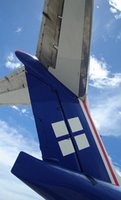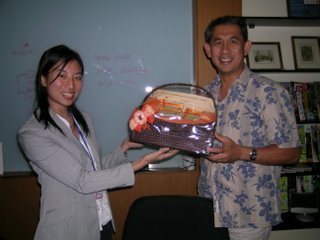 Last Friday, July 7, 2006, Maverick had the pleasure of having Harumi Supit from Airefata as a guest speaker in our weekly Friday Sharing Sessions. Looking very relaxed among the Mavericks, Harumi spoke for almost two hours giving us no-sugar coated insights on the Indonesian aviation industry and then patiently answered all of our questions.
Last Friday, July 7, 2006, Maverick had the pleasure of having Harumi Supit from Airefata as a guest speaker in our weekly Friday Sharing Sessions. Looking very relaxed among the Mavericks, Harumi spoke for almost two hours giving us no-sugar coated insights on the Indonesian aviation industry and then patiently answered all of our questions. Don’t get me wrong. Harumi was not slamming the Indonesian airlines, she just laid it out as it is. She started by giving us a picture of the commercial airlines industry from the top airliners, Garuda and Merpati, to the low cost carriers (LCC), such as Air Asia Indonesia, Lion Air, Adam Air, Batavia Air and Mandala Air. With the very tough price competition between the airlines, there are also smaller airlines, which still manage to hang in there among the bigger airlines, like Sriwijaya Air, Kartika Airlines, Ekspress, Jatayu Airlines, and Riau Airlines. However, those that couldn’t compete slowly fluttered away, like Star Air, Bali Air, Indonesia Air, Air Paradise, and Bouraq. Airefata is positioned strategically between the top airlines and the LCC’s.
Don’t get me wrong. Harumi was not slamming the Indonesian airlines, she just laid it out as it is. She started by giving us a picture of the commercial airlines industry from the top airliners, Garuda and Merpati, to the low cost carriers (LCC), such as Air Asia Indonesia, Lion Air, Adam Air, Batavia Air and Mandala Air. With the very tough price competition between the airlines, there are also smaller airlines, which still manage to hang in there among the bigger airlines, like Sriwijaya Air, Kartika Airlines, Ekspress, Jatayu Airlines, and Riau Airlines. However, those that couldn’t compete slowly fluttered away, like Star Air, Bali Air, Indonesia Air, Air Paradise, and Bouraq. Airefata is positioned strategically between the top airlines and the LCC’s.Among the still active airlines, Harumi said that Garuda was still the safest airlines in Indonesia, although they're deeply in debt. On average, Garuda has the “youngest” age aircrafts compared to the other airlines. But, according to Harumi, the age is not the main safety perimeter for an aircraft; maintenance is. Even if an aircraft is not considered “young” anymore, as long as it has been maintained well, it is safer than a newer aircraft that has been flown abusively – just like any type of machinery. A well-oiled plane should have a complete maintenance log done by reputable maintenance facilities, as well as knowing the history of every single spare parts of the airplane.
So now we know that good maintenance is key to a safe fleet, Harumi also said that pilot’s training and flight hours were essential to judge the safety of an airline. These factors can determine the decisions that a captain will make during crisis or emergency situations. Harumi said, that is why at Airefata, they carefully chose experienced pilots and invested in providing them with ample trainings and much more.
Another interesting sharing session that broadened the Maverick’s knowledge. And even with the new information we’ve just learned, we are not afraid to continue to fly because we are the fearless Mavericks and that statistically, flying is still the safest way to travel – even if we continue to ask, “Will I get there alive?”





No comments:
Post a Comment